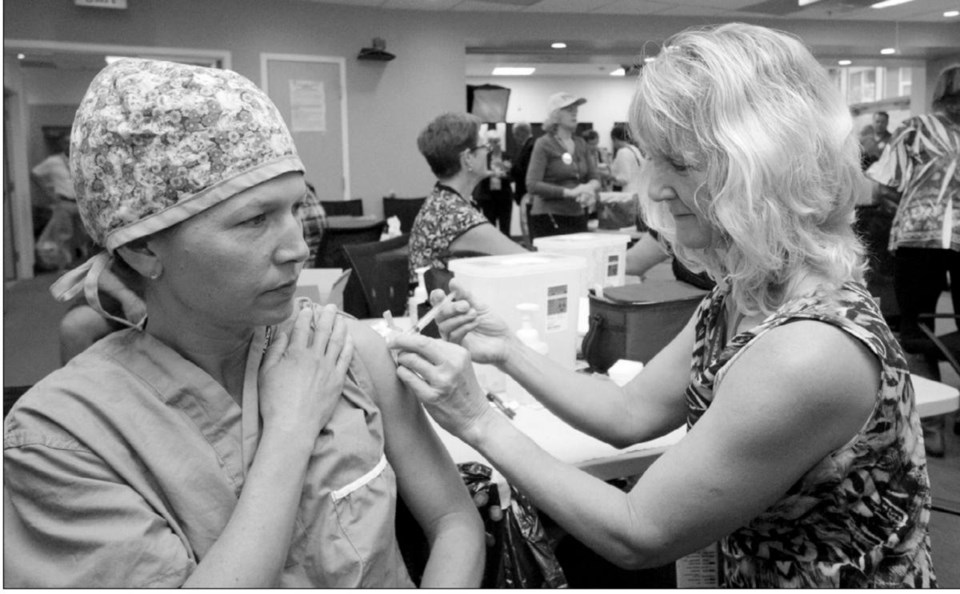'I'm a little bit torn," said Dawn Chojnacki, adjusting her hospital scrubs after getting her flu shot on Wednesday.
In the past, stories of people having bad reactions to vaccinations have made her leery. Being pretty healthy herself, rolling the dice with the flu seemed a better gamble.
On the other hand, Chojnacki, who works with operating room equipment at the Royal Jubilee Hospital, doesn't want to pass an illness to patients.
So this year, with the help of a solid elbow to the ribs from her employer, she opted for the shot.
For the first time, the Vancouver Island Health Authority is forcing staff to make a choice: get a flu shot or wear a face mask for the duration of flu season. The edict applies to all employees, physicians, contractors, students and volunteers when they come within a couple of metres of a patient. It is expected the relatively unappetizing wear-a-mask alternative will push up the immunization rate, which is usually 30 to 50 per cent of hospital workers.
It poses an intriguing question: At what point does an employer have the right to compel an employee to do something the employee thinks is personally harmful?
That's the thing about flu shots. Some people swear by them, will queue up as though Justin Bieber were giving away iPhone 5s whenever H1N1 rears its coughing, barfing head. Others shun them like Hot Dog Day at XL Foods, lumping vaccinations in with smart meters, fluoridation, surveillance cameras and other Big Brotherish impositions. Those of us who might not have been completely attentive (or sober) in science class generally put our faith in those who were, and hope they're right in advising us to get immunized.
VIHA's goal is to prevent hospital workers from infecting patients whose immune systems are already weakened.
"We're not so much protecting ourselves as protecting the people in our care," says the health authority's chief medical officer, Dr. Brendan Carr. "That's what makes health care a little different." Carr, along with several other executives, got his own flu shot at Wednesday's immunization clinic, one of 85 to be held in VIHA facilities over the next five weeks.
Carr, a recent arrival from Nova Scotia, told the story of a neighbour in Halifax, a relatively healthy, independent octogenarian who ended up in hospital after breaking her hip. She contracted the flu there a few days after surgery, and died of pneumonia. "It was a combination of stress from the surgery and fall, and influenza."
A person can be infectious a couple of days before feeling symptoms, Carr said. "The thing with flu is you can be passing the virus on before you even know you're sick. Saying 'I'll stay at home if I'm not well' isn't good enough."
Yes, but what about those workers who fear the effects of flu shots?
Well, says the University of Victoria's Eike Kluge, they have the option of wearing a mask. Kluge, a medical ethicist, has no problems with VIHA's policy.
VIHA and its workers have a fiduciary duty - a legal obligation to act in the best interests of those in their care - that trumps personal concerns, he says. An individual's rights, already limited by their effect on others ("There's an old legal maxim: Your right to swing your fist stops where my face begins"), become secondary in such circumstances. "I have the right to decide what I will do, subject to the equal and competing rights of others. That changes when you enter into a fiduciary agreement." Protection of patients then comes first.
We're not into flu season yet. It rolls around each fall, usually starting in Asia or Eastern Europe before working its way here, lasting eight to 12 weeks before it eases off around Christmas or early in the new year.
Public health clinics will begin offering free shots to those who are eligible on Oct. 22. The list includes seniors, children under age five and those who live with them, the obese, people with chronic diseases, health-care workers, emergency responders, aboriginals, chicken farmers (really!) and others. Go to viha.ca/flu/public for details. B.C. health authorities received 1.1 million doses for free distribution last year.
Others can pay for flu shots from their family physicians, who should begin receiving vaccines over the next week or so.



